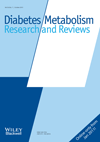Diabetes is not an independent risk factor for hepatocellular carcinoma
Abstract
Background
It is controversial whether diabetes is a risk factor for hepatocellular carcinoma (HCC) in countries with high prevalence of viral hepatitis such as Taiwan.
Methods
From the Taiwanese National Health Insurance, 1 000 000 insurants were randomly selected for the study. Among them, 494 080 men and 502 841 women without HCC were followed from 2003 until 2005. Relative risks were estimated taking into account alcohol-related diagnoses, chronic liver disease, potential HCC detection examinations and other covariates.
Results
The diabetes patients were more likely to receive examinations of abdominal sonography, HBsAg, anti-HCV and alpha-fetoprotein. Multivariable-adjusted relative risk (95% confidence interval) was not significant for diabetes as a risk factor for HCC in either men or women: 0.932 (0.788–1.101) for men and 1.158 (0.968–1.386) for women. While comparing diabetes duration <1, 1–3 and ≥3 years to non-diabetes individuals, the respective relative risks were 1.043 (0.751–1.448), 0.945 (0.738–1.209) and 0.901 (0.744–1.091) for men; and were 0.950 (0.610–1.480), 1.169 (0.884–1.546) and 1.189 (0.974–1.452) for women. For both sexes, age, alcohol-related diagnoses, chronic liver disease and potential detection bias were significantly associated with higher risk, but dyslipidemia and stroke a lower risk. In addition, chronic obstructive pulmonary disease was associated with a lower risk and sulfonylurea a higher risk in men. Models that did not consider alcohol-related diagnoses, chronic liver disease and potential detection bias would result in spurious association between diabetes and HCC.
Conclusions
Diabetes is not an independent risk factor for HCC after considering the effects of alcohol-related diagnoses, chronic liver disease and potential detection bias. Copyright © 2013 John Wiley & Sons, Ltd.




